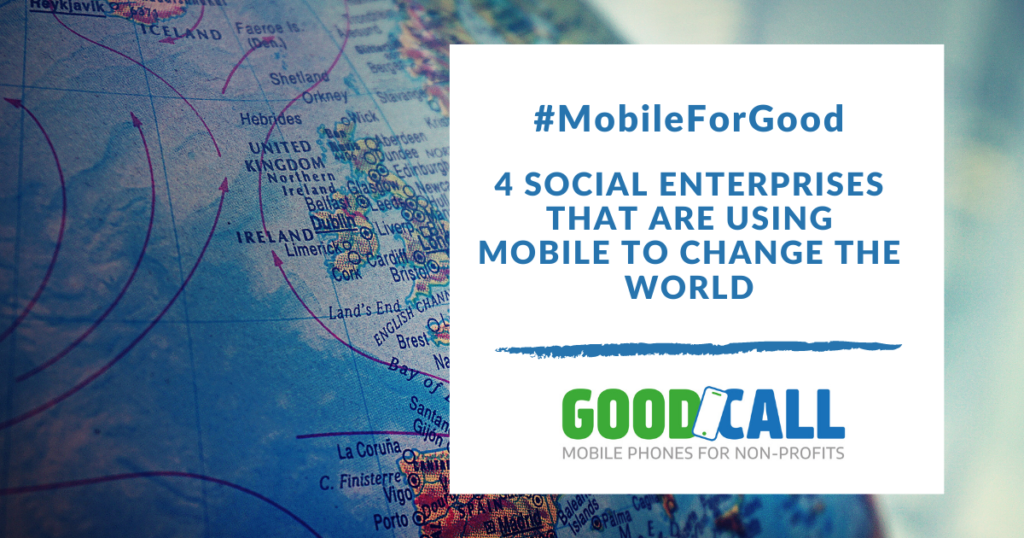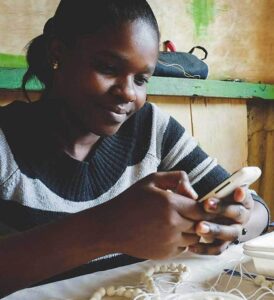
We believe socially minded businesses have the power to change lives. Technology has created a new generation of social entrepreneurs who are going above and beyond to connect communities and build new ways of working. Here we have 4 examples of social enterprises that are using mobiles to make a difference for marginalised communities – creating new livelihoods, boosting health outcomes and tackling complex social needs. At GoodCall we believe mobile has the power to change lives, and we admire these businesses who are harnessing #MobileForGood:

Soko is a jewellery social enterprise that uses mobile technology to connect marginalised Kenyan artisans directly to the global marketplace. Unlike centralised factory production, they use technology to enable the human workforce. It is supported by mobile technology that allows artisans in remote locations to become entrepreneurs through the skills they already have by using their smart phones.
It allows artists and creators to overcome barriers to accessing geographic and economic challenges – with Soko’s custom build technology their lives can change for the better. Bringing expertise from a background in entrepreneurship and mobile technology development, Soko built a brand that challenges fast fashion and empowers women around the world. With international headquarters in Nairobi, San Francisco, and New York City, they have supported over 1000 artisans in over 30 countries all through the power of mobile technology. They have created new livelihoods and boosted skills for women who have been previously excluded from building their own businesses thus leaving a lasting impact on remote communities. You can visit Soko at https://shopsoko.com/.
In 2011, Kenyan farmer Su Kahumbu Stephanou created a mobile phone app that would change the nature of farming in rural African communities. It’s initial purpose was to allow local farmers to track the gestational periods of their cows, making it much easier to understand the health needs of their animals. The system works via SMS text, so even those who don’t have a smartphone can use it to track and store vital information.
In 2020, it has grown to hundreds of thousands of users in Kenya, Tanzania and Ethiopia and can improve users’ animal health and crop yields – boosting income security and land productivity. The award-winning app has expanded its services to include advice and information, allowing farmers to connect with each other regardless of geographic location and has evidence that it can boost their income in as little as three months.
In April 2020, the team used information gathered from thousands of shepherds and small holders to identify a deterioration in farm animal husbandry and welfare in Kenya due to the coronavirus pandemic. They believe this an opportunity to design a new scalable mobile solution for animal husbandry services to cope with the impact of the pandemic on farmers and their communities. You can find out more about iCow at https://icow.co.ke/.

The social enterprise Sevamob is transforming approaches to primary healthcare in India through mobile. They are building a framework for mobile clinics and tele-health – with massive potential to reach more people through accessible healthcare solutions. It specifically targets those who face economic hardship and combines the expertise of localised healthcare teams and cloud-based mobile technology. It uses some of the latest developments in mobile to manage long term health outcomes for some of India’s most marginalised groups.
With rural poverty and a lack of social mobility impacting many communities, Sevamob aims to overcome negative outcomes for public health – such as high child mortality and reduced life expectancy. Sevamob uses mobile technology that can work offline in remote communities. This means the company can provide access to tele-health services such as diagnostics, access to medicine, vision and dental services. Mobile technology is vital to the work they do – they collect health information via data enabled tablets and smartphones and aggregated to show community health information. They hope to reach half a million more citizens by 2022 – boosting community health across the population. You find out more about Sevamob here.
Simprints is a mobile social enterprise that tackles one of the world’s most pressing problems. More than two billion people have no formal means of identification. This can make it extremely difficult for them to access healthcare and aid. Simprints produces one of the world’s lowest cost biometric fingerprint scanners that can be easily connected to a mobile phone
This overcomes issues such as illiteracy and poverty which prevent many people from ever gaining formal identification documents. It can also give health workers and NGOs a reliable identification tool which can immediately connect to cloud-based patient records, no matter where they are in the world.
Simprints is also open sourcing their software and scanner technology so that social entrepreneurs can adapt their biometric mobile technology for a whole range of uses. One massive area of potential is the effective distribution of aid packages to remote rural communities and those impacted by natural disaster. Visit Simprints here.
———————————————————————————————-
These social enterprises demonstrate the power of mobile for good – businesses that simply would have not been possible without mobile technology. Check out our #MobileForGood blog series for more stories about organisations delivering a big impact in communities around the world.
At GoodCall, we can support your charity to help you connect with your service users and supporters. We provide bespoke advice to help you make the most of your mobiles. Get in touch with us now via our contact form or call Elaine on 07535 396 882.